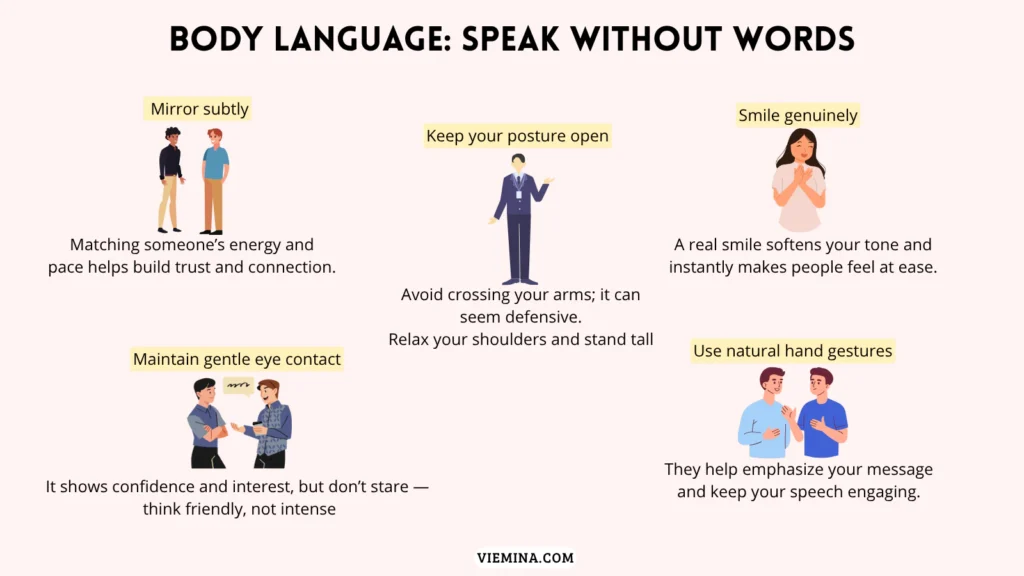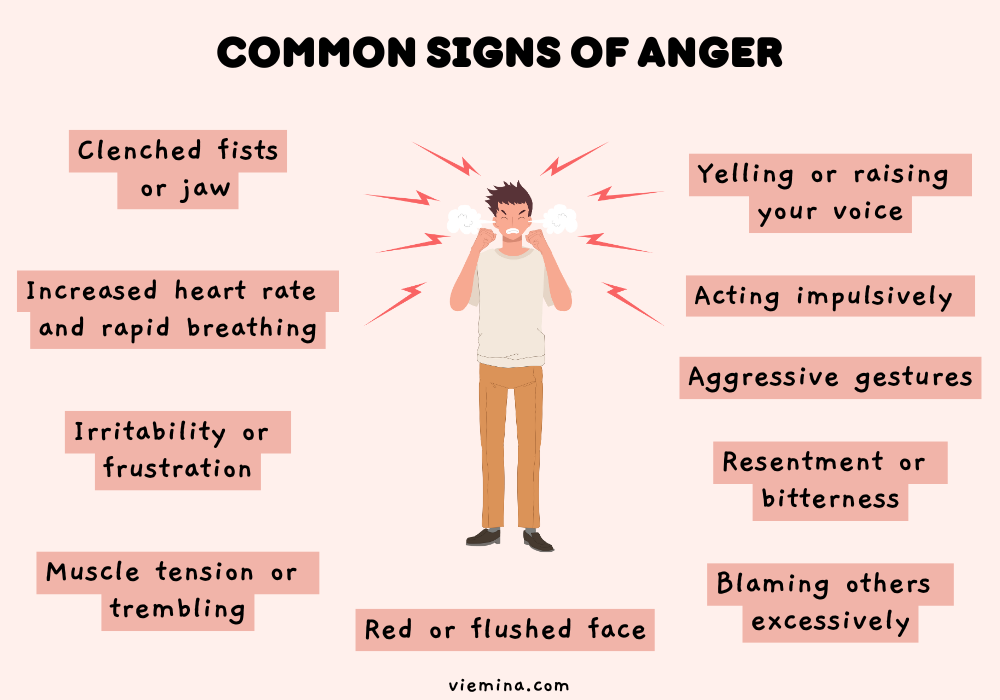Why Speaking Well Is a Superpower ?
Ever say something… and immediately wish you could say it better? Yeah, we’ve all been there!
Learning how to speak well isn’t about using big, fancy words. It’s about sharing your ideas clearly and kindly. It’s about feeling sure of yourself and making a real connection with others.
According to studies, fear of public speaking is consistently ranked as one of the most common phobias, often cited as people’s number one fear, surpassing even the fear of death. So, if your heart races when it’s your turn to talk, you’re definitely not alone.
But here’s the beautiful part: speaking well is a skill you can practice and get better at, like learning to ride a bike. It’s a journey that never truly ends, and every conversation you have is an opportunity to learn.
When you speak with honesty and warmth, you don’t just share ideas — you connect. You make people feel what you mean.
Don’t try to sound perfect. Just sound like your best self — clear, calm, and kind.
And now let’s look at some simple tips to help you become a more confident and clear speaker

Why Speaking Well Matters ?
Here’s the thing — how you speak changes how people see you.
Whether you’re explaining an idea, asking for help, or leading a team, your voice becomes your personal brand.
Warren Buffett once said, “If you can’t communicate, it’s like winking at a girl in the dark — nothing happens.”
It’s true. You can be brilliant at what you do, but if you can’t express it clearly, the world won’t see your light.
Good speaking skills don’t just help you “sound smart.” They help you:
- Build credibility and trust
- Strengthen relationships (at work and in life)
- Reduce misunderstandings and stress
- Feel more confident in your own skin
When you speak well, people listen — not because your words are fancy, but because your energy feels grounded and genuine.
Related: 20 Ways to Practice Self Love and Be More Confident
The Psychology Behind Good Speaking
Our brains don’t just process words — they pick up on rhythm, tone, and emotion.
That’s why someone who speaks calmly and clearly feels instantly trustworthy.
Have you ever noticed that what someone *says* is only part of the story? The real magic of good speaking is all about psychology—how our brains naturally connect with others. First, it’s crucial to know that most of our communication isn’t about words. A famous study by psychologist **Albert Mehrabian** came up with the **7-38-55 rule**. It suggests that only 7% of the messages we receive come from the actual words. A much bigger 38% comes from the speaker’s tone of voice, and a huge 55% comes from their body language. This is why your posture and the sound of your voice build trust before you’ve even made your main point.
Next, our brains are wired for connection through something called **emotional contagion**. Just like catching a yawn, we unconsciously “catch” the feelings of the person speaking. If a speaker is genuinely passionate and friendly, the audience will start to feel those positive emotions too, creating a powerful shared experience.
Finally, it’s important to remember that everyone’s brain has a limit, a concept called **cognitive load**. We can only take in so much information at once. This is why speaking clearly, using pauses, and keeping your message simple isn’t just a good idea—it’s a necessity. You’re helping your audience’s brain process your message without overloading it. When you understand these simple psychological principles, you can speak in a way that feels authentic, builds trust quickly, and truly connects with people.
How to Speak Well and Confidently in 15 Easy Steps:
We learn to talk when we’re young, but somehow, no one ever sits us down for a lesson in *how* to truly communicate. It’s one of the most essential skills we use in our entire lives—at work, with friends, and at home—yet most of us are just winging it.
If you’re ready to express your ideas more clearly and connect more easily with others, you’re in the right place. Here are some simple, powerful ways to help you speak well and communicate more effectively.
1-Practice active listening:

Want to know the single most overlooked secret to being a great speaker?
It’s not just about your vocabulary. It’s not just about your tone. It’s about becoming a world-class listener.
We often treat conversation like a tennis match where we’re just waiting to hit the ball back. But true communication is not just about talking back and forth. It is more about understanding what the other person is throwing—really feeling the weight and spin of their words.
Research shows that when people feel listened to, it activates the same brain regions associated with reward and pleasure. In simple terms, making someone feel heard feels as good as receiving a monetary reward.
This is why active listening is the superpower of effective communicators. It’s not a passive act; it’s an engaged process of:
- Holding space instead of planning your rebuttal.
- Absorbing the meaning behind their words.
- Making the other person feel valued.
When you do this, you build a bridge of trust. Suddenly, the conversation isn’t “me vs. you,” but “us vs. the problem.” You can navigate different communication styles because you’re focused on the shared goal of understanding.
As leadership expert Stephen Covey famously said, “Most people do not listen with the intent to understand; they listen with the intent to reply.”
Flip that script. Listen to understand. You’ll be amazed at how much wiser your responses become and how much deeper your connections grow.
2-Maintain eye contact during conversations:

Regardless of whether you’re talking or listening, gazing into the other person’s eyes can lead to a more effective exchange. Making eye contact demonstrates that you are engaged and interested, which in turn motivates the other person to show interest in you and the conversation as well.
(If addressing a large crowd is intimidating, find a few friendly faces in different parts of the room to focus on.)
3-Prepare and Practice!
It’s natural to feel nervous; even seasoned speakers experience a rush of adrenaline. The key is not to eliminate nerves, but to channel them into a dynamic performance. The best way to overcome anxiety is to prepare, prepare, and prepare some more. By rehearsing your material thoroughly—whether by recording yourself or practicing in front of a friend—you transform anxiety into readiness, ensuring you’re alert and prepared to give your best.
4-Be Focused and Brief:
Have you ever listened to someone use a thousand words but say nothing? We’ve all been there. The truth is — powerful communication isn’t about saying more; it’s about meaning more with less.
Speaking well means choosing your words with care. Keep your message simple, clear, and easy to follow. Before you speak, pause and think: What do I really want to say? Who am I saying it to? That moment of awareness helps you stay on point.
Think of your words like a spotlight — the more focused the beam, the brighter your message shines. Clutter it with filler or fancy words, and the light dims.
Quick Tips to Sharpen Your Message:
- Start with a Compass, Not a Map. Define your single core message and your audience. Every word should guide toward that goal.
- Edit in Real Time. Ask yourself — is this word adding clarity or just noise? Cut what doesn’t serve your point.
- Use Repetition Wisely. Repeat your key message only when it strengthens understanding — not when it fills space.
As George Orwell said, “If it is possible to cut a word out, always cut it out.”
Your goal isn’t to sound impressive — it’s to be understood. When you master the art of being brief, your message doesn’t just reach people — it stays with them.
5-Utilize body language and nonverbal signals:
When learning **how to speak well**, we often focus only on our words. But here’s a secret: more than half of what people understand from you comes not from your words, but from your body language. Your posture, your expressions, and the look in your eyes tell a story just as powerful as what you’re saying.
So, how can you use this to **speak well**? Start by keeping it natural: relax your shoulders, maintain gentle and engaged eyes (no intense staring required!), and use an open, welcoming posture.
If you want to refine your delivery, try a quick practice in front of a mirror. Watch how you use gestures and facial expressions as you speak. This isn’t about being perfect; it’s about ensuring your body conveys the same warm, confident message as your words.
Mastering this harmony between your verbal and non-verbal cues is what will truly help you **speak well** and be not just heard, but deeply understood.
Related: How to Be More Attractive? 10 Rules To Boost Your Charisma
Related: Magnetic Personality: 8 Traits and How to Develop Them

6-Use Stories and Varied Evidence to Engage:
Facts tell, but stories sell. Audiences connect with stories on an emotional level, which makes your message more memorable. Audiences generally like a personal touch in a speech. A story can provide that. To make your points even more compelling, use a technique called triangulation: support your claims with three different types of evidence, such as a data point, a testimonial, and an anecdote. This approach reinforces your idea and allows the audience ( or the person you talk to) to connect with it in multiple ways.
Related: Using Stories for More Effective Communication
7-Structure Your Content for Clarity and Impact:
A well-organized speech acts as a roadmap for your audience, making your message easy to follow and remember. Research shows that people retain structured information up to 40% more reliably than free-form information. Create a clear framework with a strong opening, organized main points, and a dynamic conclusion. Using established structures like Problem-Solution-Benefit or What?-So What?-Now What? can help you stay on track and ensure your audience stays with you.
Related: How To Improve Mental Clarity? 16 Ways to Achieve It
8-Stress management:
A little stress can sharpen your focus, but when it builds, it can hijack your ability to communicate clearly. You might find yourself rushing your words, struggling to find the right ones, or reacting in ways you later regret.
This is a universal experience. Studies show that a significant majority of people report feeling anxious about speaking in professional or social situations. ( According to the National Institute of Mental Health reports that public speaking anxiety, or glossophobia, affects about 40% of the population.)
This kind of tension works directly against your goal to **speak well**, often leading to misunderstandings.
So the key to mastering **how to speak well** isn’t to eliminate stress, but to manage it effectively so your true clarity and confidence can shine through.
The key is to regulate your stress before you speak, not during. Try this:
- Pause and breathe deeply: Slow, steady breaths calm your nervous system and lower your heart rate.)
- Visualize success: Picture yourself speaking clearly and confidently. Visualization helps your brain “rehearse” calm communication.
- Loosen your body: Roll your shoulders, stretch your neck, unclench your jaw — tension in your body makes your voice tighter.
- Slow down: Silence is not your enemy. Taking a moment before you speak gives you control over your tone and the message you convey.
Quick Tip: Calm energy is magnetic. When you manage your stress, people not only hear your words — they feel your presence.

9-Change your pitch and tone to enhance your speaking skills:
Match Your Tone and Voice to the Moment.
Your tone sets the mood of every conversation — a warm and calm tone builds trust, while a sharp or rushed tone creates tension.
Think of it like your outfit: always match it to the moment.
- Be warm and upbeat during teamwork.
- Be gentle and steady in emotional moments.
- Be clear and direct in professional settings.
Your voice isn’t just sound — it’s expression. Vary your pitch, pace, and volume to keep your message alive. Speak with energy when it matters, slow down to emphasize key points, and let genuine emotion guide your delivery.
The secret to powerful communication isn’t volume — it’s balance, awareness, and authenticity.
10-Put Away Distractions and Be Fully Present:
Good communication isn’t just about talking — it’s about presence.
If you’re checking your phone, replying to messages, or mentally managing your to-do list, you’re not truly listening.
Some studies found that multitasking during conversations reduces comprehension and emotional connection. So, to be a great communicator, give people your undivided attention. Here’s how:
- Put your phone face down or out of reach. Even seeing notifications can split your focus.
- Maintain eye contact. It shows respect and makes people feel valued.
- Listen to understand, not to respond. When you focus on the person speaking, your replies become more thoughtful and natural.
- Create quiet spaces for important talks. Noise and interruptions kill clarity.
Quick Tip: Presence is the most underrated communication skill. The more attention you give, the more connection you build.
11-Prime Your Audience with a Hook:
Forget boring introductions. The first moments of your talk are your most valuable real estate. Instead of a standard “hello,” pull your audience in immediately.
Think of your opening like a movie trailer—it should make them lean in and think, “I need to hear this.”
How to Create Your Hook:
- Ask a provocative question: “What if everything you knew about productivity was wrong?”
- Share a surprising statistic: “Right now, 80% of people in this room are planning a career change.”
- Tell a micro-story: “Two years ago, I failed so badly I almost gave up. That failure is why I’m here today.”
For example, instead of starting a talk on innovation with a polite greeting, you could begin:
> “What if I told you the most innovative mind of our time was once told he ‘wasn’t creative enough’?”
This isn’t just a better opening—it creates a *curiosity gap*. You give them a puzzle, and they’ll stay to hear the solution. Master this, and you’ll own the room from your very first word.
12-Master the “Resonant Face” and Smile:
A “resonant face” is active and engaged, showing your audience that you are present and passionate. This involves using expressive eyebrows, eye contact, and a genuine smile. Research from the University of Portsmouth suggests that humans subconsciously follow the direction of a speaker’s gaze, making them more engaged.
Furthermore, smiling not only makes you appear more friendly and confident, but the act of smiling can also trigger a genuine positive emotional state in you, the speaker.
This happens because of a feedback loop called” the facial feedback hypothesis.”
So, don’t just deliver a message—build a connection. Let your expressions do the talking, and your words will become truly magnetic.
Related: How To Develop an Endearing Personality: 18 Steps to Shine
13- End with a “Call to Action”:
A memorable speech shouldn’t just end—it should launch your audience into their next step. This is the power of your Call to Action (CTA).
Don’t let your ideas fade away. Tell your listeners exactly what you hope they’ll do, feel, or think.
Make It Clear & Compelling:
- A Direct Ask: “This week, I challenge each of you to apply just one of these techniques.”
- An Inspiring Vision: “Together, Let’s go out and build the future we all deserve”
By providing a clear next step, you transform your words from a moment of passive listening into a catalyst for real change. Give your audience a purpose, and your message will live on long after you’ve finished speaking.
14-The Art of Staying Open-minded:
You know that feeling when you strongly disagree with someone—your boss, a coworker, a friend—and all you can think about is making your point?
Here’s a simple shift that changes everything: try to understand their side first.
When you make space for opinions that aren’t yours, magic happens. People feel respected, not defensive. You don’t have to agree—just showing that you’re really listening completely changes the conversation.
This is what it really means to speak well. It’s not about being the loudest voice in the room. It’s about creating the kind of atmosphere where everyone feels safe to share ideas, and where disagreements actually lead to better solutions instead of hard feelings.
It’s how you turn arguments into conversations that actually go somewhere.
Related: Leadership Mindset: 12 Crucial Elements for Success
Related: The Power of Mindset Transformation: 15 Keys to Success
15-Giving and Receiving Feedback:
**Speaking well** isn’t just about talking; it’s about creating a dialogue. A simple but powerful way to do this is by embracing feedback.
If you’re unsure you were understood, just ask! A great technique is to have the person play back your main point in their own words. This instantly confirms understanding and prevents mix-ups later.
Not all feedback will be positive, and that’s okay. The goal isn’t to agree with every piece of criticism, but to listen for the truth within it. Ask yourself, “What can I learn here?” If you need more clarity, don’t be afraid to ask follow-up questions.
**Keep your focus on your audience.** Watch their reactions. Are they nodding along, or do they look confused? A confused glance means you should pause and clarify. An energized room means you can build on that momentum.
By listening and adapting, you transform a one-way speech into a real conversation that resonates.
7 Key components of communication skills include:
1-Verbal Communication:
Sharing thoughts and ideas clearly with spoken words. This involves paying attention to clarity and tone, and the ability to convey messages concisely.
2-Non-verbal communication:
Sharing information without speaking or writing. This includes facial expressions, body language, and other cues that help with effective communication.
3-Written Communication:
Sharing thoughts and ideas through writing, such as emails and documents, necessitates using clear language and organizing the content effectively.
4-Active listening:
Paying close attention to others when communicating. It’s important to understand their message and respond well.
5-Contextual communication:
- Interpersonal Skills:
Forming and keeping good relationships with people. This includes empathy, solving conflicts, and managing social situations well.
- Adaptability:
Adapting how you communicate based on who you’re talking to and the situation.
6-Giving helpful feedback:
Delivering feedback and suggestions in a positive, constructive manner.
7-Taking feedback well:
Respond to suggestions positively and use them to improve.
Conclusion:
And there you have it — learning how to speak well isn’t about memorizing rules or sounding perfect. It’s about growth. Like a muscle, your communication skills strengthen with every mindful conversation, every pause before you respond, and every moment you choose intention over impulse.
Remember, the goal was never perfection. It’s a connection. When you speak with clarity and lead with kindness, you don’t just share words—you build a bridge. You allow others to see your ideas, and more importantly, to understand the person behind them.
This is your journey to speak well — to express yourself clearly, connect deeply, and leave a positive mark wherever you go.
You have a voice that deserves to be heard. Now, go make yourself understood.
Ready to take the next step? Share your biggest communication win or challenge in the comments below—let’s keep learning from each other
Related: 15 Ways to Overcome Stage Fright and Build Confidence
FAQs About How to Speak Well:
1. What does it really mean to “speak well”?
To speak well means expressing your thoughts clearly, calmly, and kindly — not perfectly. It’s about connecting with people, not impressing them with big words. When your message is easy to follow and your tone feels genuine, that’s what good communication looks like.
2. How can I improve the way I speak every day?
Start small. Record yourself talking, slow down your pace, and really listen before you respond. Try replacing filler words (“um,” “like,” “you know”) with short pauses — it makes you sound more confident and thoughtful. Most importantly, practice daily — with friends, coworkers, or even in front of a mirror.
Quick tip: Reading out loud for five minutes a day can work wonders for your flow and confidence.
3. I get nervous when I talk in front of people. How can I manage that?
Studies show nearly 75% of people experience **public speaking anxiety**(National Institute of Mental Health, 2023).
The trick isn’t to eliminate nerves, but to manage them. Before you speak, take a deep breath. Focus on the value of your message (not the fear), and the people you’re connecting with, not on being perfect. With practice, the anxiety loses its power.
4. Why is tone so important when speaking?
Your tone sets the emotional temperature of any conversation. Warm and calm? You build trust. Sharp or rushed? People tune out. A friendly tone helps your words land the right way and makes others feel heard — even if you’re saying something difficult.
5. Can speaking well really help my career or relationships?
100%. Learning **how to be a good communicator** is one of the most impactful things you can do for yourself. In your career, it helps you lead meetings, ace interviews, and collaborate effectively. In your relationships, it prevents misunderstandings and builds deeper trust.
Speaking well isn’t just a soft skill — it’s a superpower that strengthens both your personal and professional life.








